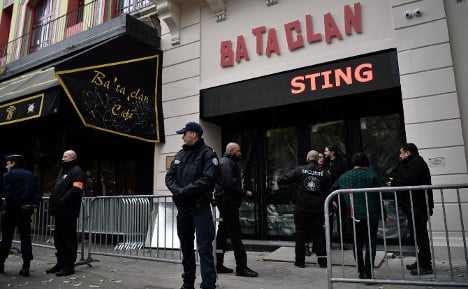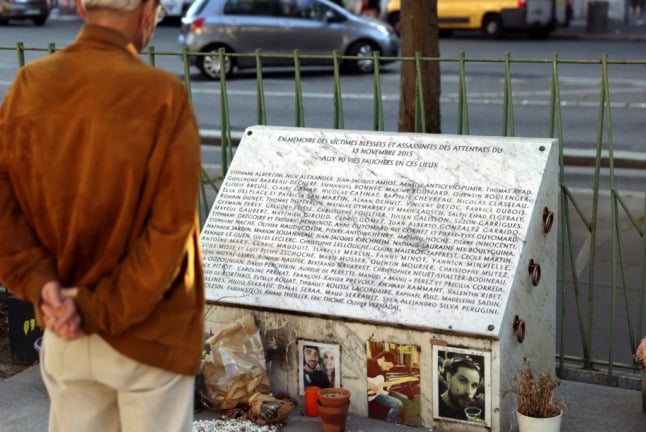Concert goers returned to the Bataclan music hall in Paris on Saturday night for the first time since last November's Paris terror attacks.
The venue opened its doors for a concert by British rocker Sting, the first musician to take to the stage since Eagles of Death Metal, whose gig was targeted by jihadist gunmen, wearing suicide vests.
The took place amid tight security with a huge area around the venue cordoned off. There was also a huge media presence outside the venue.
Families of the victims and those who were there on the night of the attack to watch the Eagles of Death Metal, were also invited as special guests as well as fans of the rock star, who came on stage at 9pm.
“We have two tasks: to honour victims who lost their lives and to honour music and life,” said Sting as he took to the Stage. A minute silence was held for the victims followed by loud applause.
#sting reopens #bataclan in French pic.twitter.com/tkmFG35Kqz
— Melissa Bell (@MelissaBellCNN) November 12, 2016
Some 1,500 people were expected at the gig, which sold out within 30 minutes last week. All proceeds will go to two victims associations representing survivors and the family of those who died.
One year on #Bataclan is open pic.twitter.com/3WgFCQkRdA
— Ed Williams (@EdWilliamsUK) November 12, 2016
Welcome back, Rock n Roll #Bataclan pic.twitter.com/vatMxAQWAs
— Alexandre Moreau (@Mister_Moreau) November 12, 2016
Didier Delalande, from Rennes told The Local he had come to the Bataclan to remember his friend's sister Caroline Prenat, 24, who was killed at the venue last year.
“It will be emotional but we are here in a show of strength in her memory,” he said. “I'm happy to be here but I'm also scared at the same time, because of our thoughts for the victims.
“But music is stronger than anything.”
Didier Delalande is at #Bataclan in memory of friend's sister Caroline Prenat, 24 who was killled.'I'm happy to be here but I'm also scared' pic.twitter.com/PaBvsI3cYv
— Ben McPartland (@McPBen) November 12, 2016
Psychologists were on hand at the Bataclan to help the survivors and families of the victims if needed.
Des psychologues sont présents au #Bataclan pour venir en aide aux rescapés et familles de victimes si besoin. pic.twitter.com/bKjWBe60tV
— J-Francois Belanger (@belangerjf) November 12, 2016
Another concert goer Umberto, an Italian who lives in Paris told The Local: “We will cry, we will dance and we will cry again.”
Georges Salines the head of the victims association “13th November – Fraternity and Truth”, who lost his daughter Lola in the attacks said: “It's important this venue reopens to show that we are standing up to the terrorists who tried to destabilize our lives.”
Georges Salines head of victims group is at #Bataclan tonight. 'It's important this venue reopens to show we are standing up to terrorists' pic.twitter.com/yXZLrKJ25y
— Ben McPartland (@McPBen) November 12, 2016
The Bataclan was ravaged by three suicide blasts as well as the bullets unleashed by the attackers, firing systematically into the crowd as an ordinary Friday night descended into carnage.
As expected there's a huge media and police presence at the #Bataclan tonight for the venue's first gig since last November's terror attack. pic.twitter.com/ykcVxVMLMS
— Ben McPartland (@McPBen) November 12, 2016
The carnage inside the Bataclan claimed 90 victims. Another 40 people died in attacks on bars, restaurants and at the Stade de France in the deadliest attack in France since World War Two.
The interior of the former 19th-century music hall has now been gutted during eight months of refurbishment works.
Everything from the seats to the floorboards were replaced with identical fittings to purge the horror of that fateful night.
Co-director Jules Frutos (see pic below) told AFP that they had had their doubts and “for some time it was difficult”.
“But then, after a few weeks it was clear. We had to go on after such horror and not leave a mausoleum, a tomb,” said Frutos.
“One night of tragedy” should not be allowed to wipe out decades of great musical memories, he insisted.
“We owed it to ourselves to rebuild everything. It was obvious that it had to be rebuilt identically,” added Frutos, who has managed the venue with his business partner Olivier Poubelle since 2004.
“It's important we didn't change it as a venue, its past — that's why people loved it. One night of tragedy mustn't overshadow decades of parties and music,” he said.



 Please whitelist us to continue reading.
Please whitelist us to continue reading.
Member comments